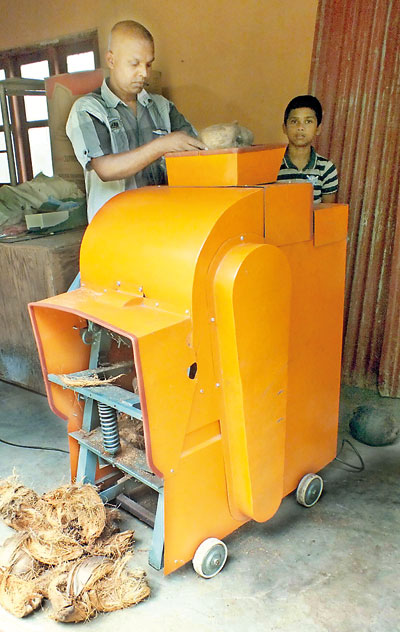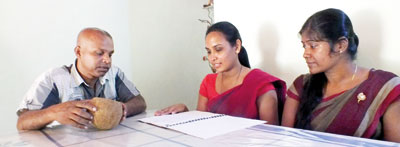Coconut de-husking machine, another invention supported by NSF
No all but some institutions and individuals work towards building a strong economy in the country and, among them, the National Science Foundation (NSF) provides technological grants with these stretched across multi-faceted fields – agriculture, industry, science, technology, medicine, etc.

Semi-automatic coconut de-husking machine with Samarasinghe Bandara – investor of the machine - feeding coconut into the machine assisted by one of his sons.
These NSF grants and their recipients have been regularly profiled in the Business Times with positive results.
In the meantime, agriculture crops – tea, rubber, coconut and cinnamon – have contributed significantly to the economy but has some constraints towards its development due to a shortage of labour at the basic stages for example plucking tea, plucking and de-husking coconuts, tapping rubber and peeling cinnamon. Locals are reluctant to take up these jobs, despite their social status of being poor, due to poor pay, lack of prestige and social acceptability.
In solving the labour problem in the de-husking of coconut, the NSF awarded a grant to manufacture a semi-automatic coconut de-husking machine, a new invention with patent rights.
The inventor, K.M. Samarasinge Bandara from Wilegoda, Eheliyagoda has been a versatile mechanic for the last 25 years and is reputed for making various innovative machines which won awards, along the way.
He has some relatives in Anuradhapura and while he was visiting his relative, passing Wariyapola, Kurunegala he saw heaps of coconut on either side of the road in these areas and learning about the labour shortage he got the idea of manufacturing a coconut de-husking machine.
Around six years ago with this basic idea he started the blue print of the coconut de-husking machine and though there were financial constraints he started work on the machine. While struggling to complete the machine, he came across an advertisement in which the NSF was granting financial assistance towards such projects. Accordingly he applied and was successful in obtaining the grant in 2016.
Visiting the project
In a bid to find out about the completion of this much-needed semi-automatic coconut de-husking machine, the Business Times (BT) team last week joined two NSF Scientific Officers – Ms. Ruvini Gamage and Ms. Shanthi Sivasubramaniam and visited Mr. Bandara’s workshop – ARM Engineering, Panawala Road, Wilegoda, Eheliyagoda.
A service oriented man, Mr. Bandara has a technological knack of turning out utility machines. The family lives near a Kelani river tributary and there, he turned out a floating power generator that generated a kilowatt of power, going on to win an award.
He turned out a machine that cleans denim trousers (Dust Cleaner) for Orit Garment Factory at Awissawella. Further, he manufactured a large scale machine to sift rice flour which could sift more than 30 tons per day and likewise there were several such machines that won awards.
Though he turned out many such innovative machinery he could not take these to the commercial level due to lack of financial backing. In the case of the NSF-assisted coconut de-husking machine he is on the way to success. However, to produce on a large scale, he says he would face the same financial constraint since a single machine would cost around Rs. 300,000 which he cannot raise at the moment.
The NSF has granted him Rs. 246,300.
While the team was looking at the working of the machine at his workshop, Ms Gamage gave reasons as to why the NSF awarded the grant, saying there were no such machines available in Sri Lanka.
She said that if such machines are imported, they would be highly costly and would result in other problems like adjustability to the local conditions and the issue of spare parts. She said that there are small tools now available but this semi-automatic machine would be ideal to the average grower, irrespective of large or small.
Ms. Sivasubramaniam said that there could also arise environmental issues like the thickness of the husk and the different sizes of the nuts. She said that sizes would vary depending on the geographical location of coconuts grown in the country.
Mr. Bandara said that if further funds are available he could make this machine to be fully automatic. Now the nuts are fed one by one from the top of the machine and the husked nut and the husk comes out through an outlet down the machine. He said that a conveyor belt could be added, to enter one nut at a time and also make the husked nut and husk to come out separately.

Mr. K.M. Bandara describes the semi-automatic coconut de-husking machine and shows another of his inventions – a plant pot made out of coconut fibre compressed with rubber. Others in the picture are Ms. Ruvini Gamage and Ms. Nishanthi Sivasubramaniam, NSF Scientific Officers.
Big demand
He said that already there is a big demand for the machine and buyers are even prepared to pay an advance to purchase them. Even though he has obtained patent rights for the machine, if one machine is turned out and displayed, there is a likelihood of copying it with slight changes. If a number of machines could be marketed then this fear of copying is not there, because then they could be marketed at a cheaper rate.
“I went to the Coconut Development Authority (CDA) and they are willing to buy the machine and the Authority wants the first machine.”
They wanted him to turn out machines so that they could arrange selling them, but Mr. Bandara says that there are no funds to turn out any further machines as the present machine was made with the funds given by the NSF, he indicated.
He requested the CDA to advance some funds to continue manufacturing machines, but he said that the agency has not accepted his request. He said that he visited the Export Development Board (ADB) where he found some programmes pertaining to new inventions, but could not get a clear response on inquiry.
He appealed to any state agency or private sector to join hands with him with investment where he could consider a collaboration. His telephone number is 071915591 and the email is araeng8@gmail.com


